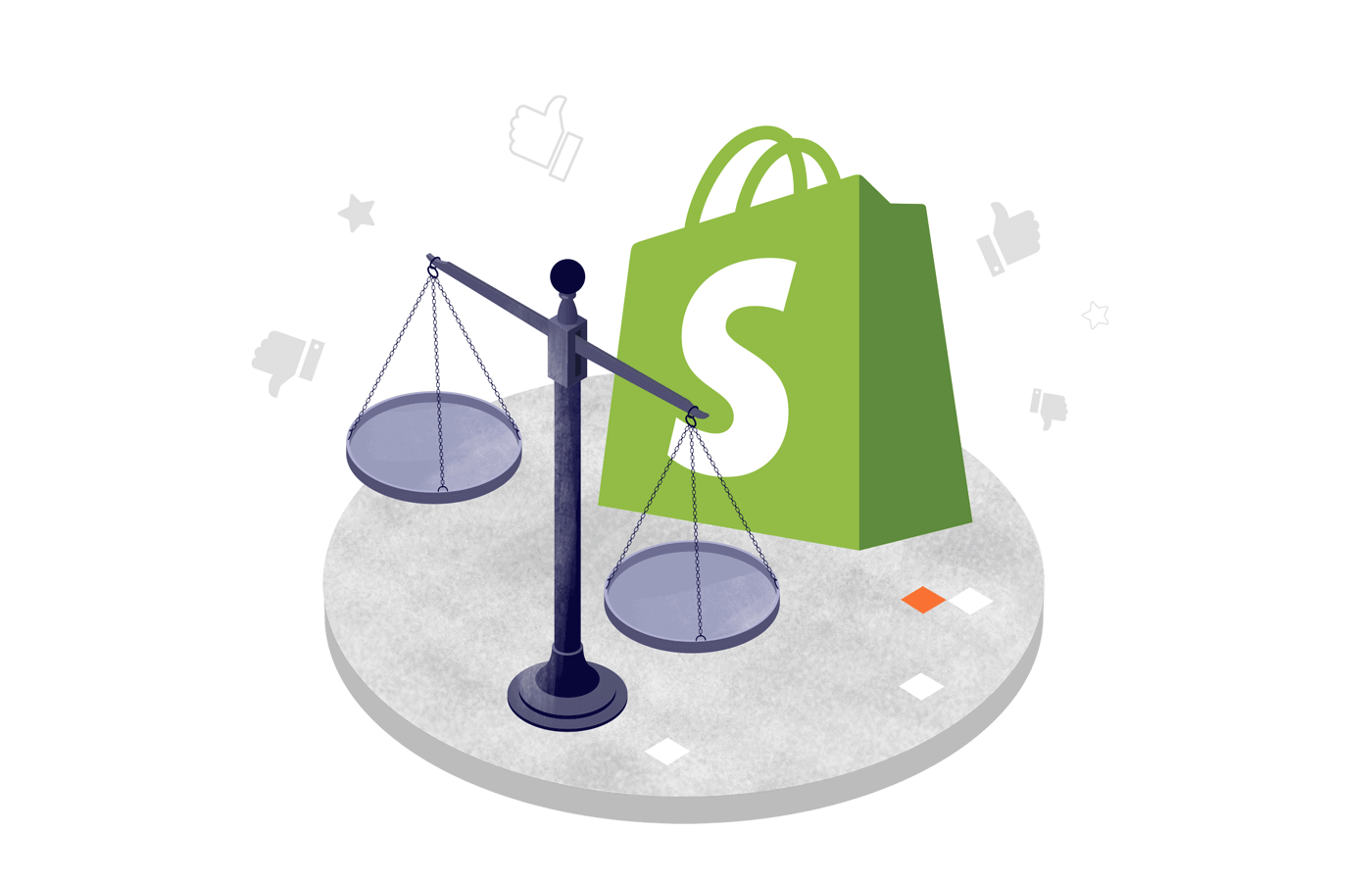Shopify offers user-friendly e-commerce solutions but comes with transaction fees and limited customization. It’s ideal for beginners but may frustrate advanced users.
Shopify is a leading e-commerce platform known for its ease of use and robust features. It enables businesses to set up online stores quickly without needing extensive technical skills. The platform offers a wide range of templates and apps, making it adaptable for various business needs.
Shopify also provides excellent customer support and integrates well with various payment gateways. Despite its advantages, some users find the transaction fees and limited customization options restrictive. Advanced users might find the platform less flexible compared to other solutions. Nonetheless, Shopify remains a popular choice for many online retailers due to its simplicity and effectiveness.
Introduction To Shopify
Shopify is a popular e-commerce platform. It helps businesses create online stores. Many people prefer Shopify for its ease of use. Below, we discuss what Shopify is and why you should choose it.
What Is Shopify?
Shopify is an e-commerce platform. It allows you to set up an online store. You can sell products and services through it. Shopify offers various tools to help you manage your store. These tools include inventory management and payment processing.
Shopify was founded in 2006. Since then, it has grown rapidly. Today, it powers over a million businesses worldwide. It is known for its user-friendly interface. Beginners and experts alike find it easy to use.
Why Choose Shopify?
There are many reasons to choose Shopify. First, it is easy to use. Even beginners can set up a store quickly. The platform offers many templates. You can customize these templates to fit your brand.
Shopify also supports various payment methods. This makes it easy for customers to pay. The platform integrates with many third-party apps. These apps extend the functionality of your store. You can add features like email marketing and customer reviews.
Shopify provides excellent customer support. You can reach them 24/7 through chat, email, or phone. They also have a vast knowledge base. This helps you resolve common issues on your own.
Another benefit is Shopify’s scalability. It can grow with your business. Whether you are a small startup or a large enterprise, Shopify can handle your needs.
Here is a table summarizing the main pros and cons of using Shopify:
| Pros | Cons |
|---|---|
| Easy to use | Monthly fees |
| Customizable templates | Transaction fees |
| Multiple payment options | Limited free themes |
| 24/7 customer support | Learning curve for advanced features |
| Scalable | Cost of add-ons |
Ease Of Use
Shopify is popular for its ease of use. Many store owners, new and experienced, choose Shopify for this reason. Let’s explore the details under two main aspects: User-Friendly Interface and Learning Curve.
User-friendly Interface
Shopify boasts a very user-friendly interface. The dashboard is clean and intuitive. Even beginners can navigate it with ease. Here are some key features:
- Simple drag-and-drop functionality
- Customizable themes
- Clear navigation menus
This interface helps store owners manage products, track orders, and view analytics without hassle. The design is streamlined, which saves time and reduces stress.
Learning Curve
The learning curve for Shopify is relatively low. Most users can set up their store quickly. There is an abundance of resources available for learning:
- Extensive documentation
- Video tutorials
- Community forums
Support is also readily available. Shopify offers 24/7 customer support via chat, email, and phone. This support ensures users can get help whenever needed.
Customization Options
Shopify is a popular e-commerce platform, known for its extensive customization options. These options allow businesses to tailor their online stores to meet specific needs. Let’s explore the customization aspects of Shopify, focusing on Themes and Templates and Third-Party Integrations.
Themes And Templates
Shopify offers a wide range of themes and templates. These help users create attractive and functional online stores. You can choose from free and premium themes. Free themes are good for beginners. Premium themes provide more features and better designs.
Customizing themes is easy with Shopify’s user-friendly interface. You can adjust colors, fonts, and layouts without coding. For more advanced customization, you can edit the HTML and CSS files directly. This allows for unique designs and tailored user experiences.
Shopify also supports responsive design. This ensures your store looks good on all devices. A responsive design improves user experience and can boost your search engine ranking.
Third-party Integrations
Shopify supports numerous third-party integrations. These integrations enhance your store’s functionality. You can add features like email marketing, social media sharing, and inventory management.
Most integrations are available through the Shopify App Store. The app store offers both free and paid apps. Installing these apps is simple and requires no coding skills. Popular apps include Mailchimp for email marketing and Oberlo for dropshipping.
Integrations can also improve your store’s efficiency. For instance, accounting apps like QuickBooks help manage finances. Customer service apps like Zendesk enhance support.
It’s important to choose the right integrations. Too many apps can slow down your site. Always check app reviews and ratings before installation.
Cost Considerations
Shopify is a popular choice for eCommerce. It’s essential to understand its costs. Let’s explore the pricing plans and hidden fees.
Pricing Plans
Shopify offers three main pricing plans. Each plan has different features and costs.
| Plan | Monthly Cost | Features |
|---|---|---|
| Basic Shopify | $29 |
|
| Shopify | $79 |
|
| Advanced Shopify | $299 |
|
Choose a plan based on your business needs and budget.
Hidden Fees
Be aware of hidden fees that can add up. These include:
- Transaction fees: Shopify charges 2.9% + 30¢ per transaction.
- App fees: Many apps are not free. They can increase costs.
- Theme fees: Premium themes have one-time costs, ranging from $140 to $180.
These fees can impact your overall budget.
Carefully review all potential costs before making a decision.
Scalability
Scalability is a critical factor for any growing business. Shopify is a popular eCommerce platform known for its scalability. Let’s explore the pros and cons of Shopify in terms of scalability.
Growing Your Business
Shopify allows businesses to grow without significant technical challenges. It offers numerous features that support expanding your store. These features include:
- Unlimited product listings
- Multiple sales channels
- Advanced inventory management
Shopify also provides various apps and plugins. These tools help manage your growing customer base and sales volume. Integration with social media platforms and marketplaces like Amazon and eBay is seamless. This integration boosts your reach and sales opportunities.
The platform offers different pricing plans. These plans cater to both small startups and large enterprises. You can start with a basic plan and upgrade as your business grows.
Limitations
While Shopify is scalable, it has some limitations. The primary concern is the cost. As your business grows, you may need to upgrade to a higher pricing plan. This can become expensive over time.
Another limitation is the transaction fees. Unless you use Shopify Payments, you will incur additional transaction fees. This can impact your profit margins.
Customization can also be a challenge. Shopify has a limited number of free themes. Advanced customization often requires hiring a developer. This adds to your operational costs.
Lastly, third-party app dependency can be a concern. Many features require additional apps, which may come with extra costs and complexities.

Credit: adoric.com
Support And Resources
When using Shopify, having access to ample support and resources is crucial. Shopify provides various tools to help you succeed. Below, we explore the Customer Support and Educational Resources available.
Customer Support
Shopify offers 24/7 customer support. You can reach them through:
- Live Chat
- Phone
Having round-the-clock support ensures you can solve issues quickly. The support team is knowledgeable and helpful. This can be a lifesaver during emergencies.
Many users report positive experiences with Shopify’s support. The staff is known for being friendly and efficient. This level of support can give you peace of mind.
Educational Resources
Shopify provides a wealth of educational resources. These resources help you learn and grow. Some of these include:
- Shopify Academy
- Help Center
- Community Forums
- Blog Articles
Shopify Academy offers free courses on various topics. These courses cover everything from setting up your store to advanced marketing strategies.
The Help Center is a detailed knowledge base. You can find step-by-step guides and tutorials. This is helpful for troubleshooting and learning new features.
The Community Forums allow you to connect with other users. You can ask questions and share experiences. This peer support can be very valuable.
Shopify also maintains a blog. The blog offers tips, best practices, and industry news. This keeps you updated and informed.
Security And Reliability
Shopify is a popular e-commerce platform. Its security and reliability are crucial. Understanding these aspects helps in making informed decisions. Let’s dive into the pros and cons of using Shopify for your online store.
Data Protection
Shopify offers robust data protection features. It uses SSL encryption, ensuring secure transactions. This protects customer information from hackers. Shopify is PCI DSS compliant. This means it follows strict security standards. Your store and customer data remain safe.
On the downside, Shopify controls the server security. You have less control over custom security measures. Sometimes, updates can cause temporary vulnerabilities. Relying on Shopify’s security can be a limitation.
Downtime And Uptime
Shopify boasts a high uptime rate, around 99.98%. This means your store is almost always online. Reliable uptime ensures more sales and happier customers. Shopify handles server maintenance and updates. This reduces the risk of downtime due to technical issues.
Yet, no platform can guarantee 100% uptime. Occasional downtimes can happen during maintenance. During these times, your store may be temporarily unavailable. It’s essential to be aware of this possibility.
| Feature | Pros | Cons |
|---|---|---|
| Data Protection |
|
|
| Downtime and Uptime |
|
|

Credit: www.sender.net
Seo And Marketing Tools
Shopify is a powerful e-commerce platform that offers many SEO and marketing tools. These tools help businesses improve their online visibility. Let’s explore the pros and cons of Shopify’s built-in features and third-party apps.
Built-in Features
Shopify comes with several built-in SEO features. These are easy to use, even for beginners. Some of the most important ones include:
- Customizable Title Tags and Meta Descriptions: Helps improve click-through rates and search engine ranking.
- SEO-Friendly URLs: Automatically generated URLs that are clean and readable.
- Mobile Optimization: Ensures your store looks great on mobile devices.
- XML Sitemap: Automatically created to help search engines crawl your site.
These built-in features are user-friendly. They make it easy for store owners to optimize their websites.
Third-party Apps
Shopify’s App Store offers many third-party apps. These apps extend the platform’s SEO and marketing capabilities. Some popular ones include:
- SEO Manager: Provides advanced SEO features like keyword suggestions and broken link fixing.
- Plug in SEO: Offers comprehensive SEO audits and recommendations.
- Google Analytics: Integrates seamlessly to provide detailed insights into your website’s traffic.
- MailChimp: Helps with email marketing campaigns and customer engagement.
Using third-party apps can greatly enhance your store’s performance. Yet, they can also add to your monthly costs.
Both built-in features and third-party apps have their pros and cons. Built-in features are easy to use and cost-effective. Third-party apps offer advanced functionalities but can be pricey. Choose the tools that best suit your business needs.
Pros Of Using Shopify
Shopify is one of the most popular e-commerce platforms today. It offers numerous benefits that make it a preferred choice for many online sellers. Below, we explore the key advantages of using Shopify.
Ease Of Setup
Setting up a Shopify store is incredibly simple. You don’t need any technical skills. The platform offers a user-friendly interface. This ensures that even beginners can navigate it with ease.
Shopify also provides a variety of templates. These templates are customizable. You can easily tailor them to fit your brand. The setup process is smooth and quick. This allows you to start selling almost immediately.
Comprehensive Features
Shopify is packed with features. These features cater to all aspects of running an online store.
- Payment Gateways: Shopify supports multiple payment options.
- Inventory Management: Easily track and manage your products.
- SEO Tools: Built-in SEO features help improve search engine rankings.
- Customer Support: 24/7 customer service is available.
- App Store: Access to a wide range of apps to extend functionality.
These features ensure that your store runs smoothly. They also help you grow your business efficiently.
Cons Of Using Shopify
While Shopify offers numerous benefits, it’s not without its drawbacks. Understanding these cons can help you make an informed decision.
Transaction Fees
Shopify charges transaction fees if you don’t use Shopify Payments. These fees can add up, especially for small businesses. Here’s a quick look at the transaction fees:
| Plan | Transaction Fee |
|---|---|
| Basic Shopify | 2.0% |
| Shopify | 1.0% |
| Advanced Shopify | 0.5% |
These fees can reduce your profit margins. It’s important to consider them in your budget.
Customization Limitations
Shopify’s themes offer limited customization options without coding. To make significant changes, you might need to hire a developer. This can be costly and time-consuming. Here are some customization limitations:
- Limited design flexibility
- Restricted theme customization
- Need for coding knowledge
These limitations can restrict your brand’s unique look. Make sure to evaluate if Shopify’s customization meets your needs.

Credit: techaffinity.com
Frequently Asked Questions
What Is The Disadvantage Of Shopify?
One disadvantage of Shopify is its transaction fees. Using third-party payment gateways increases costs. Customization options can also be limited.
Is It A Good Idea To Use Shopify?
Yes, Shopify is a good idea for e-commerce. It offers user-friendly features, scalability, and robust support. Many businesses trust Shopify for online sales. It provides customizable themes and easy payment integration. SEO tools are also available to boost online visibility.
Is There Any Risk With Shopify?
Yes, there are risks with Shopify, including transaction fees, limited customization, and potential security vulnerabilities. Always back up data.
What Does Shopify Struggle With?
Shopify struggles with advanced customization and complex inventory management. Limited built-in SEO features can affect search rankings. High transaction fees can also be a drawback.
Conclusion
Shopify offers many advantages, including ease of use and scalability. It also has some drawbacks, like transaction fees and limited customization. Weighing these pros and cons will help you decide if Shopify suits your business needs. Explore all options to find the best fit for your eCommerce venture.